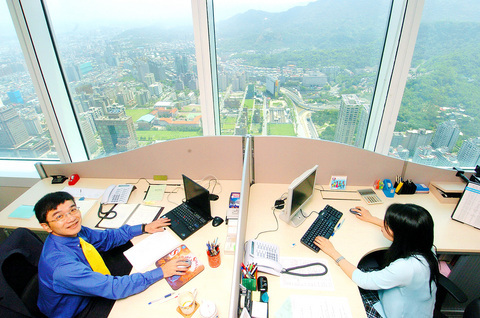The world's highest skyscraper, Taipei 101, yesterday welcomed the Bayer Group as its first tenant and is preparing for its second tenant, Swiss insurer Winter Life, to move in later this month.
Bayer, which is Germany's second-largest chemical and drug maker, will locate its Taiwan headquarters on the tower building's 53rd and 54th floors. The new office space accommodates about 230 of Bayer Taiwan's employees.
"We like this building very much, and believe it is the safest place to work, with the high-tech infrastructure and design," said Elmar Stachels, chief executive officer of Bayer's Greater China region, during the moving-in ceremony yesterday.

PHOTO: CHANG CHIA-MING, TAIPEI TIMES
With a five-year lease, Bayer believes the move will help it attract domestic and international businesses, as well as bolster its business in Taiwan, Stachels said.
Future tenants
Winter Life will relocate its Taiwan branch to Taipei 101 next Monday, said Harace Lin (
Other future tenants include Peoples' King International Co, D.B. Zwirn Advisors Taiwan and the Taiwan Stock Exchange Corp (TSE). The TSE is currently the largest tenant, holding the 9th to the 12th floors. It will move in by year's end.
Now that the first tenant has commenced operations in the building, more potential customers waiting on the sidelines will be more interested in exploring leasing options, said Calvin Wang (王治平), managing director of Jones Lang LaSalle International Property Consultants, the leading leasing agent for the skyscraper.
Currently, the occupancy rate at Taipei 101 is still about 35 percent for the 58,000-ping office space, but Wang is confident that the building will be 60 percent to 70 percent full by the end of the year, and next to full by the end of next year.
"Many companies have shown strong interest in making Taipei 101 their address these days, [giving it] prestige like the Empire State Building in New York City," Wang said.
As for the safety concerns of some prospective tenants following several accidents during the tower's construction, Wang said doubts had been dissolved now that the building had withstood several major earthquakes. As a result, current tenants were more interested in renting higher levels of the building.
Strict controls on access would also give confidence to customers, Wang said.
Floor pass
Taipei 101 utilizes the Visitor Access Kiosk System developed by Siemens AG, which enables visitors to key in the floor or company they want to visit.
With confirmation by the tenant, the visitor receives a pass allowing entry through a security door.

KEEPING UP: The acquisition of a cleanroom in Taiwan would enable Micron to increase production in a market where demand continues to outpace supply, a Micron official said Micron Technology Inc has signed a letter of intent to buy a fabrication site in Taiwan from Powerchip Semiconductor Manufacturing Corp (力積電) for US$1.8 billion to expand its production of memory chips. Micron would take control of the P5 site in Miaoli County’s Tongluo Township (銅鑼) and plans to ramp up DRAM production in phases after the transaction closes in the second quarter, the company said in a statement on Saturday. The acquisition includes an existing 12 inch fab cleanroom of 27,871m2 and would further position Micron to address growing global demand for memory solutions, the company said. Micron expects the transaction to

Vincent Wei led fellow Singaporean farmers around an empty Malaysian plot, laying out plans for a greenhouse and rows of leafy vegetables. What he pitched was not just space for crops, but a lifeline for growers struggling to make ends meet in a city-state with high prices and little vacant land. The future agriculture hub is part of a joint special economic zone launched last year by the two neighbors, expected to cost US$123 million and produce 10,000 tonnes of fresh produce annually. It is attracting Singaporean farmers with promises of cheaper land, labor and energy just over the border.

US actor Matthew McConaughey has filed recordings of his image and voice with US patent authorities to protect them from unauthorized usage by artificial intelligence (AI) platforms, a representative said earlier this week. Several video clips and audio recordings were registered by the commercial arm of the Just Keep Livin’ Foundation, a non-profit created by the Oscar-winning actor and his wife, Camila, according to the US Patent and Trademark Office database. Many artists are increasingly concerned about the uncontrolled use of their image via generative AI since the rollout of ChatGPT and other AI-powered tools. Several US states have adopted

A proposed billionaires’ tax in California has ignited a political uproar in Silicon Valley, with tech titans threatening to leave the state while California Governor Gavin Newsom of the Democratic Party maneuvers to defeat a levy that he fears would lead to an exodus of wealth. A technology mecca, California has more billionaires than any other US state — a few hundred, by some estimates. About half its personal income tax revenue, a financial backbone in the nearly US$350 billion budget, comes from the top 1 percent of earners. A large healthcare union is attempting to place a proposal before